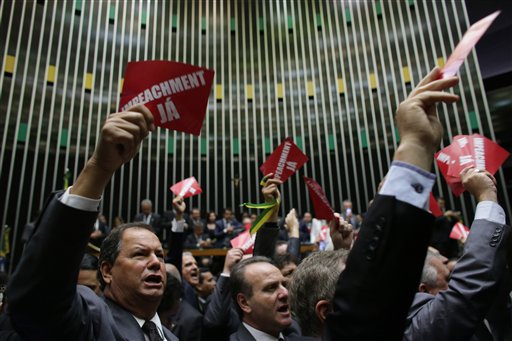Brazil’s political crisis deepened as judges filed injunctions to block the appointment of former President Luiz Inacio Lula da Silva as chief of staff to his successor following a tumultuous swearing-in ceremony and heated protests.
The first of the injunctions was overturned by a higher court, the state-run Agencia Brasil news agency said Friday. But another was issued immediately by a second judge in Rio de Janeiro, adding to the country’s political confusion.
President Dilma Rousseff’s opponents accuse her of trying to help the once-popular Silva avoid legal woes. He was taken in for questioning in a sprawling corruption probe less than two weeks ago. Cabinet members cannot be investigated, charged or imprisoned unless authorized by the Supreme Court.
Why the once adored Lula returns to a mixed reception
Turn the clock back 10 years and it would be difficult to imagine protests on this scale against the man known simply as Lula. President Obama once called his former counterpart “The Man,” such was his standing among international leaders.
So how did this once-adored Lula returns to mixed reception? CCTV America’s Owen Fairclough reports.

Rousseff has insisted the Cabinet appointment has nothing to do with any legal problems, saying Silva would help put the country back on track economically and spearhead the fight against attempts to oust her over allegations of fiscal mismanagement. The impeachment process moved a step closer Thursday as the lower house established a special commission on the matter.
The simmering anger that bought an estimated 3 million people onto the streets in nationwide anti-government demonstrations over the weekend again spilled over, with protests flaring Thursday in Brasilia and Sao Paulo, where demonstrators brandished inflatable dolls of Silva in black-and-white prison stripes. A pro-Silva rally was slated for Friday, but it was not clear whether the former leader would attend.
Rousseff went on the offensive at Thursday’s swearing-in ceremony, calling those pressing for her removal “putschists” and accusing Sergio Moro, the judge who is leading the corruption probe at the state-run oil company Petrobras, of violating the constitution and acting in a partisan manner.
“Shaking Brazilian society on the base of untruths, shady maneuvers, and much-criticized practices violates constitutional guarantees and creates very serious precedents,” Rousseff said. “Coups begin that way.”
The injunctions suspending Silva’s nomination were widely expected as such tactics are often used against political appointments and decisions. Legal experts were divided on the effects. Some attorneys insisted Silva is now a Cabinet minister regardless of the injunctions, and enjoys the special legal standing afforded by the role. Others contended the injunction must first be ruled upon by higher courts.
Solicitor General Jose Eduardo Cardozo, a close ally of Rousseff’s, said “political motivations” were behind the injunctions, which he called “absolutely inappropriate.”
Both Rousseff and Silva have repeatedly denied any wrongdoing, but Rousseff has seen her popularity nosedive as the country of 200 million has spiraled into crisis after crisis.
The Petrobras corruption investigation has stained Brazil’s political and business elite. The country is ground zero for the Zika virus, which scientists believe can lead to birth defects. The economy is mired in the worst recession since the 1930s. And in the midst of it all, Brazil is set to host the Summer Olympics in Rio de Janeiro in August.
At Thursday’s swearing-in ceremony, Rousseff lashed out at Wednesday’s surprise release of tapped phone calls between Silva and a host of prominent public figures, including Rousseff herself. Judge Moro released the recordings hours after the announcement of Silva’s appointment, saying that the taps appeared to suggest attempts to influence judicial officials in Silva’s favor.
Rousseff called the recordings illegal and said their release made “clear the attempt to overstep the limits of the democratic state.”
In a letter posted by the Sao Paulo-based Lula Institute, Silva said: “I cannot accept that words illegally extracted from personal conversations become the subject of derogatory judgments.”
Moro compared the situation to a U.S. Supreme Court ruling in the Watergate scandal that toppled President Richard Nixon.
“Not even the highest authority of the republic has absolute privilege of protection of their communications,” Moro wrote, adding that the 1974 decision in the U.S. vs Nixon case was “an example to be followed.”
Meanwhile, Rousseff’s nemesis, lower house speaker Eduardo Cunha, established the committee that will decide whether to proceed with impeachment steps against her. Raucous demonstrations broke out on the floor, with opposition representatives brandishing signs reading “impeachment now” as Rousseff allies chanted “there won’t be a coup!”
Still, it was just an early step in a drawn-out process that would involve multiple votes in the lower house as well the Senate.
Story by the Associated Press
 CGTN America
CGTN America
 Opposition lawmakers hold up placards with a message that reads in Portuguese; “Impeachment Now” during the formation of a committee on whether to begin impeachment proceedings against Rousseff, in Brazil’s lower house, in Brasilia, Thursday, March 17, 2016. (AP Photo/Eraldo Peres)
Opposition lawmakers hold up placards with a message that reads in Portuguese; “Impeachment Now” during the formation of a committee on whether to begin impeachment proceedings against Rousseff, in Brazil’s lower house, in Brasilia, Thursday, March 17, 2016. (AP Photo/Eraldo Peres)
